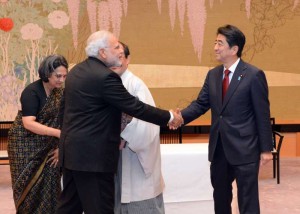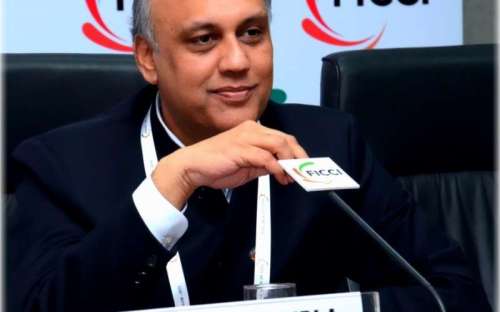FICCI President Sidharth Birla looks into Indo-Japan relations

During their meeting on September 1, 2014, Prime Minister Shinzo Abe and Prime Minister Narendra Modi further strengthened relations between the two sides by signing the Tokyo Declaration for Japan-India Special Strategic and Global Partnership. The meeting has been termed as the ‘dawn of a new era in Japan-India relations’ by both the Prime Ministers. Japan holds an important place in India’s foreign policy and economic development, and also has a special position in India’s Look East Policy. This is the reason for Prime Minister Modi’s choice of Japan as his first destination for a bilateral visit outside India’s immediate neighbourhood.
Commenting on the visit of the Hon’ble Prime Minister Narendra Modi to Japan, Mr. Sidharth Birla, President, FICCI said “This visit marks a defining moment in our relationship and will be registered in history as one that significantly elevated the level of engagement between India and Japan across areas. The agreements that have been signed and the understanding achieved under the guidance and leadership of Prime Minister Modi and Prime Minister Abe will bring the two countries closer in both strategic and economic spheres.”

“We are particularly enthused about the launch of the Japan India Investment Promotion Partnership under which the two sides have agreed to double the flow of FDI into India and the number of Japanese companies over the next five years. FICCI firmly believes that we must encourage greater export oriented FDI from Japan into India and this visit of PM has laid the groundwork for the same. Japan has committed to realise total financial flows of close to 3.5 trillion Yen into India over the next five years in projects that would form the building blocks of India’s growth such as smart cities, transport systems, clean energy, skill development and food processing”, added Mr. Birla.
“Besides economic and strategic connects, the two sides have also laid great emphasis on promoting people to people contact. Promoting tourism, youth exchanges, educational collaboration and cultural exchanges are integral to the growth of our relationship and our leaders have expressed their determination to further enhance the same”, he added.
Key Highlights of the Tokyo Declaration
India and Japan have agreed to extend cooperation on a wide range of areas. The key highlights of the Tokyo Declaration include the following:
Political, Defense and Security Partnership
• The Prime Ministers underlined the importance of the 2 plus 2 dialogue, involving Foreign and Defense Secretaries for their growing strategic partnership and decided to seek ways to intensify this dialogue.
• They agreed to upgrade and strengthen the defense relations between the two countries and welcomed the signing of the Memorandum of Cooperation and Exchanges in the field of defense during this visit.
• Both the Prime Ministers hoped that the recent developments in Japan’s policy on transfer of defense equipment and technology would usher in a new era of cooperation in this area.
• They welcomed progress made in discussions in the Joint Working Group (JWG) on cooperation in US-2 amphibian aircraft and its technology and directed their officials to accelerate their discussions.
Global Partnership for Peace and Security in the Region and the World
• Both Prime Ministers expressed satisfaction with progress in official level trilateral dialogue among Japan, India and the United States and decided to explore holding this dialogue among their Foreign Ministers.
Civil Nuclear Energy, Non-proliferation and Export Control
• The two Prime Ministers affirmed the importance of civil nuclear cooperation between the two countries and welcomed the significant progress in negotiations on the Agreement for Cooperation in the Peaceful Uses of Nuclear Energy. They directed their officials to further accelerate the negotiations with a view to concluding the Agreement at an early date, and strengthen the two countries’ partnership in non-proliferation and nuclear safety.
• Prime Minister Modi appreciated the decision of the Government of Japan to remove six of India’s space and defense-related entities from Japan’s Foreign End User List.
Partnership for Prosperity
• Prime Minister Modi appreciated Japan’s continuous support towards India’s economic development and stated that no country has done more for modernizing India’s infrastructure than Japan.
• The two countries also announced the “Japan-India Investment Promotion Partnership” under which the following decisions were taken:
a) To set a target of doubling Japan’s foreign direct investment (FDI) and the number of Japanese companies in India within five years as an objective to be jointly achieved by Japan and India.
b) To realize 3.5 trillion Yen of public and private investment and financing from Japan, including Overseas Development Assistance (ODA), to India in five years, to finance appropriate public and private projects of mutual interest such as next generation infrastructure, smart cities, manufacturing, clean energy, etc.
c) Japan to extend ODA loan of 50 billion Yen to India Infrastructure Finance Company Limited (IIFCL) for a public-private partnership infrastructure project in India.
d) To develop “Japan Industrial Townships” and other industrial townships with investment incentives for companies.
e) Prime Minister Abe welcomed the approval to establish the Mizuho Bank’s Ahmedabad branch.
• The two Prime Ministers placed special emphasis on Japan’s cooperation for enhanced connectivity and development in Northeast India and linking the region to other economic corridors in India and to Southeast Asia, which would catalyze economic development and increase prosperity in the region. The two Prime Ministers welcomed the signing of the document to promote partnership city arrangement between the ancient cities of Varanasi and Kyoto.
• Prime Minister Abe expressed his readiness to provide financial, technical and operational support to introduce Shinkansen system, for which Prime Minister Modi expressed his appreciation.
• Prime Minister Modi invited Japanese investments in the development of new Smart Cities and industrial parks along the corridors.
• Both countries agreed to explore a higher level of strategic collaboration in the global oil and natural gas market, including through joint procurement of LNG, upstream development of oil and gas, and joint efforts to promote flexible LNG markets, including through relaxation of destination clauses.
• The two Prime Ministers welcomed the agreement on a commercial contract for manufacturing and supply of rare earth chlorides from India to Japan.
Exploring Science, Inspiring Innovation, Developing Technology, Connecting People
• The two Prime Ministers decided to spur cooperation, in particular, in the cutting edge fields such as life sciences, ocean technology and ocean observations, clean and renewable energy, water technology, climate change science and outer space. They extended priority to expanding research exchanges in particular between the young scientists and students of both the countries.
• They also welcomed growing cooperation in tourism, youth exchanges, educational collaboration and cultural exchanges including the cultural activities which will be held under the Festival of India in Japan.
• They decided to make efforts to substantially increase the number of student exchanges between Japan and India as well as to enhance Japanese language education in India.